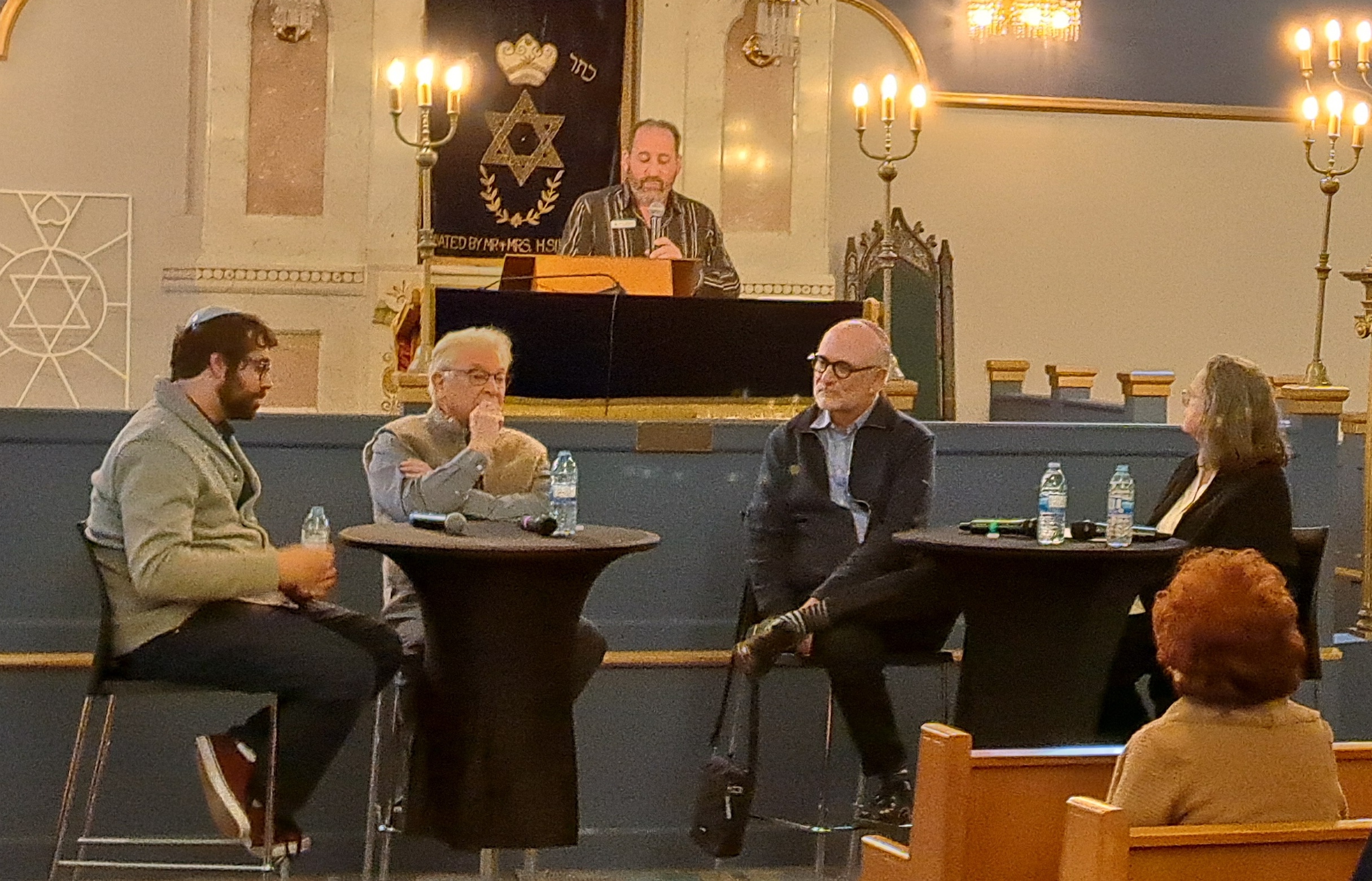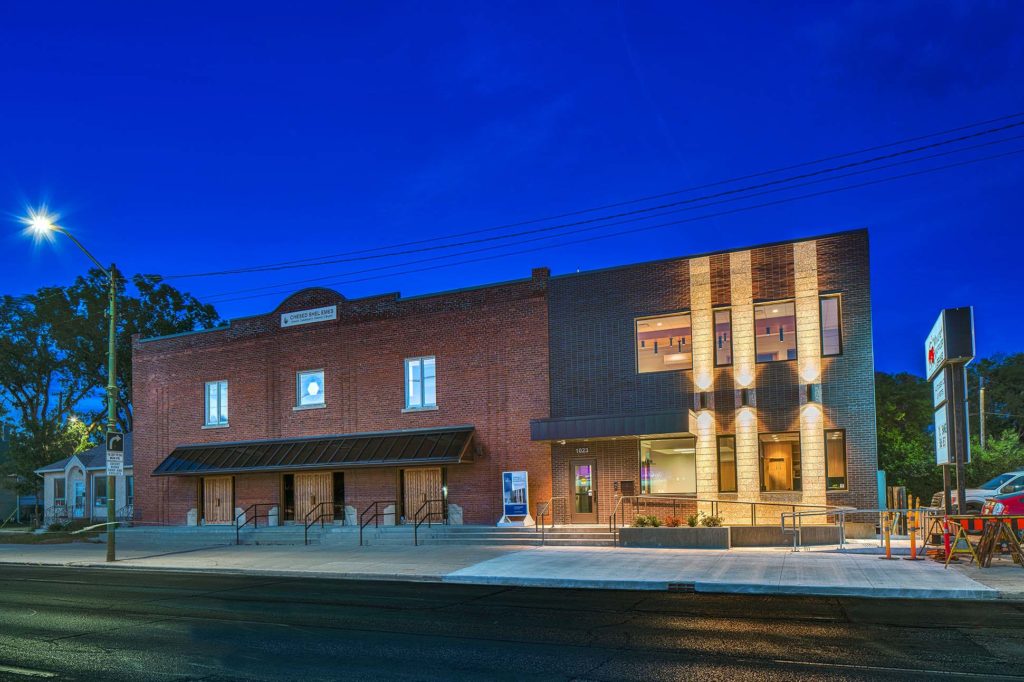Local News
Chesed Shel Emes panel delves into different aspects of death and dying

By MYRON LOVE They say there are two things you can count on in life – death and taxes. I don’t know about taxes – but no one escapes death.
When we are younger, few give much thought to dying. As we age though, we come ever closer to that final reality. The best we can hope for – in my view – is to live to a relatively old age in relatively good health and pass away quickly – preferably in your sleep.
So what would one consider a “good death?” That was one of the questions that was discussed by a panel of three experts on the subject who appeared together on Sunday, November 24, in a program at the Chesed Shel Emes titled: “The Last Stop – Reflections on Living and Dying”.
(The Chesed Shel Emes is our community’s non-profit Jewish funeral chapel; the only one of its kind in North America).
About 180 people were in attendance – both in person and online, as independent Rabbi Matthew Leibl, palliative care specialist Dr. Bruce Martin, and Dr. Harvey Max Chochinov, a psychiatrist who is one of the world’s authorities on the subject of the emotional aspects surrounding death and dying, shared their experiences and perspectives. Alison Gilmur, popular culture and lifestyles reporter for the Free Press. served as the moderator.
A “good death” – as opposed to a “bad death” – is important for patients and families alike, Chochinov noted.
“Is dying in your sleep a good death?” Rabbi Leibl asked. “That depends on both the individual and the family. It certainly doesn’t give the individual much time to think about it beforehand. I think the major concern for most people is that death be as painless as possible.”
“The problem is that you only die once,” Chochinov pointed out. “There is no rehearsal. Many fear the unknown. And you don’t know what the path will be, what it will be like for you. Or if you will still be you afterward.”
Gilmour asked the panelists what people fear most about dying? Chochinov cited the case of one woman who refused to take her medication because she feared it would make her confused – the way it had her mother prior to her death. Reassuring her that she was in capable hands allowed her to accept proper pain management and die peacefully.
Another anecdote from Chochinov concerned the case of a young woman who was facing death – with a young family and a young child at hand. “She was concerned that her little girl would have no memory of her,” Chochinov noted. “We completed something called Dignity Therapy, which allowed her to create a written legacy that would eventually be shared with her child.”
Rabbi Leibl referred to a member of the Shaarey Zedek who had been suffering for some time. She chose to die at home but, before her passing, she asked her children to leave the room. She and the rabbi talked.
“I asked if she was afraid,” he recalled. “She said that she wasn’t afraid, but that she worried that she would never see her family again.”
Dr. Martin noted that every death is personal. “There is no common thread,’ he said. “A last conversation can be profound or trivial.
“One concern for the dying is not being able to live to see their grandchildren grow up and the shared moments they will miss.”
Chochinov also added that some people are worried about the process of dying and what it may be like. “While dying is inevitable, suffering ought not to be”.
Gilmour asked what people can do to help comfort someone who is dying?
Chochinov’s answer was simple: “Be sure to show up”. “When you know someone is dying,” he noted, “for many the impulse is to stay away, to withdraw. You don’t know what to say,” he observed. “Don’t try to fix what can’t be fixed. But do show up and listen.”
Martin recalled a former mentor who suggested that the most important question that someone who is visiting someone who is terminally ill is: ‘What can you do to help?’ “
“People who are dying don’t need to be reminded about it,” Rabbi Leibl observed. “Although every case is different, a visitor should talk to the afflicted individual the same way you would talk to anyone else. You can talk about life, for example, or what you are reading, or a show you are watching together.”
Gilmour concluded her questioning by bringing up the issue of government-approved Medical Assistance in Dying (MAID) – medically assisted suicide.
A number of liberal rabbis Are in favour of MAID, Rabbi Leibl noted. “Judaism however dictates that we must do everything we can to prevent death,” he pointed out.
“I have officiated at funerals for a few people who have chosen IAID,” he reported. “One such funeral was for a Holocaust survivor – in her 90s. I spoke with her the day before she died. She was at peace. I viewed what she was doing as courageous.”
Chochinov said it is also important to look at factors that can undermine a patient’s will to live, such as poorly controlled pain, limited access to palliative care and lack of supports, including respite.“MAID is driven by a desire for personal autonomy,” he observed. “It was originally designed as an option for patients who were suffering and facing a reasonably foreseeable death.” Eligibility criteria have been expanded, making patients not imminently dying, but suffering, able to request MAiD.He expressed grave concerns about extending MAiD for people who are mentally ill. “We simply can’t know which of these patients might improve with adequate time, support and care.”
In response to a later follow-up question from a member from the audience, Bruce Martin added that, in the case of people with dementia and MAID, the latter may prevent children and grandchildren from spending more time with the parent/ grandparent. After all, who then decides when the time is right?
The panelists were asked about talking about death and dying and how to cope. Martin noted that when he speaks to kids in schools, there is a lot of interest in the subject.
A question about planned giving elicited a comment from Chochinov about the importance of not only leaving a will, but letting family know what your wishes are. “It’s never too early to talk about these things”, he said, “but if you put it off long enough, there may come a time when it’s too late”.
Local News
Thank you to the community from the Chesed Shel Emes

We’re delighted to share a major milestone in our Capital Campaign, “Building on our Tradition.” Launched in November 2018, this campaign aimed to replace our outdated facility with a modern space tailored to our unique needs. Our new building is designed with ritual at its core, featuring ample preparation space, Shomer space, and storage, creating a warm and welcoming environment for our community during times of need.
We’re grateful to the nearly 1,000 generous donors who contributed over $4 million towards our new facility. A $750,000 mortgage will be retired in November 2025, completing this monumental project in just seven years.
We’re also thrilled to announce that our Chesed Shel Emes Endowment Fund has grown tenfold, from $15,000 to $150,000, thanks to you, the Jewish Foundation of Manitoba’s FundMatch program, and Million Dollar Match initiative in 2024. Our fund helps ensure that everyone can have a dignified Jewish funeral regardless of financial need.
As we look to the future, our goal remains to ensure the Chevra Kadisha continues to serve our community for generations to come. Our focus now shifts to replenishing our savings account and growing our JFM Endowment fund.
We’re deeply grateful for your support over the past several years.
It’s our privilege to serve our community with care and compassion.
With sincere appreciation,
Campaign cabinet: Hillel Kravetsky, Gerry Pritchard, Stuart Pudavick,
Jack Solomon, and Rena Boroditsky
Murray S. Greenfield, President
Local News
Winnipeg Beach Synagogue about to celebrate 75th anniversary

By BERNIE BELLAN (July 13) In 1950 a group of cottage owners at Winnipeg Beach took it upon themselves to relocate a one-room schoolhouse that was in the Beausejour area to Winnipeg Beach where it became the beach synagogue at the corner of Hazel and Grove.
There it stayed until 1998 when it was moved to its current location at Camp Massad.
On August 2nd members of the synagogue will be holding a 75th anniversary celebration.

As part of the celebration anyone who is a descendant or relative of any of the original members of the first executive committee (as seen in the photo here) is invited to attend the synagogue that morning.
If you are a relative please contact Abe Borzykowski at wpgbeachshule@shaw.ca or aborzykowski@shaw.ca to let Abe know you might be attending or for more information about the 75th anniversary celebration.
We will soon be publishing a story about the history of the beach synagogue, which is something I’ve been writing about for over 25 years.
Local News
Vickar Family cuts ribbon on new Tova Vickar and Family Childcare Centre

By MYRON LOVE In the words of Larry Vickar, the Shaarey Zedek’s successful Dor V’ Dor Campaign “is not only a renewal of the synagogue but truly a renewal movement of Jewish life in our community.”An integral part of that renewal movement was the creation of a daycare centre within the expanded synagogue. On Monday, June 23, Larry and Tova Vickar cut the ribbon, thereby officially opening the Tova Vickar and Family Childcare Centre in the presence of 100 of their family members, friends and other supporters of the project.
The short program preceding the morning ribbon-cutting began with a continental breakfast followed by a welcome by both Fanny Levy, Shaarey Zedek’s Board President, and Executive Director Dr. Rena Secter Elbaze. In Elbaze’s remarks, she noted that Larry and Tova wanted their family (including son Stephen and family, who flew in from Florida) and friends at the event to celebrate the opening of the Tova Vickar and Family Childcare Centre, “not because of the accolades, but because, as Larry put it, he hopes that their investment in the congregation will inspire others to do the same.”
“When Larry and I spoke about what this gift meant to him and the message he wanted people to take away,” she continued, “I couldn’t help but connect it to the teachings of Reb Zalman Schachter-Shalomi whose book – Age-ing to Sage-ing – changes the whole way we look at the concept of ageing and basing it on our ancestral teachings.”
She explained that his concept of “Sage-ing” is based on three key ideas – Discover your meaning and purpose; accept our mortality and think about the legacy you want to leave.
“Larry spoke about these exact concepts when we met,” she said.
Elbaze also noted the presence of Shaarey Zedek’s newly-arrived senior Rabbi Carnie Rose, former Rabbi Alan Green, and area MLAs Mike Moroz and Carla Compton.
Larry Vickar expressed his great appreciation for all those in attendance. “Tova and I are deeply moved to stand here with you today for this important milestone in our community”, he said. “We are grateful to be surrounded by all of you, the people we care about, our family and friends… you who have touched our lives and played some part in our journey.”
